What is GNU Classpath
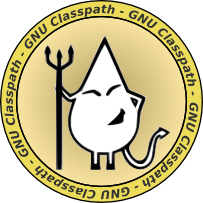
GNU Classpath is an implementation of the essential core
classes for the java programming language. It is a Free Software
library for the GNU platform. It is an official GNU project with
the FSF as custodian. And the GNU answer to what Richard Stallman
described as The Java
Trap. It is a project to make the freedom to share, study,
modify and integrate available to all Free Software hackers wanting
to use the java programming language. And it is a wonderful
community of hackers having fun!
The main drivers of the project are providing users the
freedom to tinker with the full system, pushing innovation by
creating an architecture that makes people do new things, creating
an environment where collaboration is the norm and just doing cool
stuff together.
This has resulted in a large community of people (more than
100 individuals and companies have contributed significant work now)
and projects (almost 30) all working together. Through these various
people and projects GNU Classpath has been integrated nicely within
the various GNU/Linux distributions which have started to provide
Free Software written in the java programming language based on the
GNU Classpath core classes.
Extending and enhancing the Free Software community
One of the attractive features of the GNU Classpath core
library is that it supports a very rich set of facilities. It
provides Free Software developers a reasonably well designed,
object-oriented framework that covers most needs of a typical
application. The support ranges from abstract data types to
graphical user interfaces, from low-level network abstractions to
remote method invocation with over-the-network class loading, from
mathematical libraries to database access.
We think it is a nice extension to the rich Free Software
environment that we already have. And if we manage to integrate all
the good ideas (type-safety, modularity, object-oriented, rich core
library, etc) nicely with the rest of the GNU system while
maintaining compatibility with the java core libraries then we will
reach more developers. Many people have already learned about the
language and the standard library, by providing a free alternative
we invite these people to join our community. And plenty of Free
Software is already being written in the language. Just on
SourceForge there are more than 12.000 Free Software projects. But
there are certainly also arguments against it. Java has been
over-hyped as a solution to everything, it has a bad reputation for
wasting resources (cpu, memory), early implementations were slow, it
looks like C/C++ and it doesn't integrate with any native
platform. But we think we can (and have already) fix most of these
issues while maintaining the good values.
Richard Stallman said in The GNU
Manifesto about why GNU is compatible with Unix: "Unix
is not my ideal, but it is not too bad. The essential features of
Unix seem to be good ones, and I think I can fill in what Unix lacks
without spoiling them. And a system compatible with Unix would be
convenient for many other people to adopt." We hope that we
have done the same with GNU Classpath. And that is why we make sure
GNU Classpath is compatible with the core libraries for the java
programming language.
The eco system, or write once, run where?
One of the cornerstones of the GNU system is the GNU Compiler
Collection (GCC). GCC contains compilers, libraries and tools for a
large number of programming languages such as C, C++, Objective-C,
Fortran, Ada and java. The GCJ front end is combined with GNU
Classpath as libgcj, the runtime library that provides threading,
garbage collection and dynamic linking. So GCC provides a full free
replacement for the java platform. One with some interesting
properties because GCJ can used can be used in various modes to
Compile and link .java source
files to binaries, .o or
.so files.
Compile and link .class byte
code files or while .jar class archives to
binary.
Compile .java source files to
.class byte code files (gcj
-C).
Interpret .class or
.jar byte code files during runtime
(gij).
The byte code interpreter is included as part of the
libgcj runtime and can be used by programs to
dynamically load and switch between interpreting byte code and
executing natively compiled code on demand.
And although GCJ is a very robust implementation which has
been ported to a lot of platforms we didn't stop there. GNU
Classpath is also used with more traditional Just In Time (JIT)
systems like Kaffe or Cacao; pure byte code interpreters like JamVM
and SableVM; runtimes and compilers written completely in the java
programming language like the IBM Jikes Research VM; JNode, a full
Operating System written in the java programming language; real-time
systems like OVM; Jupiter, a VM for multiprocessor clusters (128
CPU, Myrinet) and IKVM.NET, which translates java bytecode to the
.NET Intermediate Language as used by Mono.
The collaboration of these very diverse projects on a common
core library has made GNU Classpath a very robust and extensible
library. It allows us to share the development load by have a common
bug tracking system and test-suites. And it allows people to
experiment and try out various (optimization) ideas in completely
different environments.
Supporting diversity
The diversity of projects based on GNU Classpath make for some
interesting engineering challenges. There are a couple of very
different (sometimes conflicting) design goals. And the platform
that needs to be integrated with the core libraries can be very
diverse (from Posix, GNU and Gnome to the .net C# libraries or
almost bare metal). This means you don't just need a vm interface
between the runtime and the core class library. You also need a
platform interface to deal with differences in threading, keeping
track of time, timezones, i/o, network, differences in underlying
gui toolkits or how a platform handles mime-types, etc.
To support this GNU Classpath has a delegate/facade pattern
for various core or platform-dependent classes.
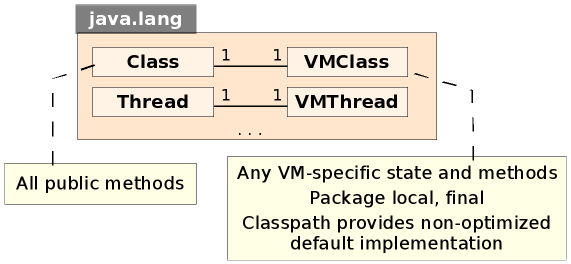
These VMClasses define a clear interface
not just between the runtime and the core class library, but also
signal were in the core class library there are platform-dependent
hooks, or places for optimization. GNU Classpath comes with a full
implementation of these classes for GNU/Posix-like systems with
hooks to GTK+ (or Qt) for the (AWT) gui classes written in C and
using the standard JNI interface. Different runtimes override some
or even all of these to provide access to their own native platform
layers.
Correctness, completeness and compatibility
One of the major focuses of the GNU Classpath project is
expanding and using the free Mauve test suite for Compatibility,
Completeness and Correctness checking. Various groups around GNU
Classpath collaborate on the free software Mauve test suite which
contains almost 50.000 core library tests. Mauve has various
modules for testing core class library implementations, byte code
verifiers, source to byte code and native code compiler tests.
Mauve also contains the Wonka visual test suite and the Jacks
Compiler Killer Suite. All these tests are continuously run on the
development sources and carefully checked before each release to
make sure no regressions occur. They can also be used to validate
ports to new platforms.
The current release of GNU Classpath is 0.90. The packages
supported are mostly those of 1.4. In the last year we added support
for the Swing gui toolkit, Corba, a full JCE crypto provider, CUPS
support for printing and ALSA support for sound. ImageIO and
Graphics2D are two places that still need some work (integrating
with the Cairo graphics library). Work on supporting the new 1.5
classes has already started on a separate branch. And we hope to
have full 1.5 support in GNU Classpath by the end of this year. Most
of the additional packages are already supported, most of the core
library has been "genericized" on the branch, and there is a start
of a new VM/Class interface for the generic and annotation
reflection support. We also already have instrumentation and a VM
interface for it. What is missing is sql.rowset support, text.html
support and some of the newer ssl support, plus various new methods
here and there, but all those don't need any exta runtime
support. Things that need extra VM support are the new management
(mx) and util.concurrency packages. There is a preliminary VM
interface for the currency package already. Although one can use GDB
for debugging we will also add support for JDWP to facilitate
debugging with for example Eclipse.
GNU Classpath on your GNU/Linux Desktop
In the last couple of years various GNU/Linux distributions
have started to bundle applications based on GNU Classpath. A very
diverse set of applications and tools are now supported like office
suites (OpenOffice), development environments (Eclipse),
peer-to-peer applications (Azureus) and application servers (JOnAS
and Tomcat).
For developers there are several full free development system
available now in modern GNU/Linux distributions. You can use GCJ to
compile your applications to fast (production quality) machine code,
but as part of the critically important GCC suite, releases are not
as frequent to allow more time for testing. So the latest stable
release of gcc 4.1 is still based on an older GNU Classpath. Other
runtimes that have more traditional interpreter/jit designs, like
Kaffe, Cacao and JamVM do more rapid releases and sometimes include
more advanced features earlier. And recent releases of Mono come
with IKVM.NET and GNU Classpath included to make integration of .net
and java easy. The Gnome platform now includes official java-gnome
bindings for integration with all the desktop features. All these
work with the Eclipse integrated development environment which makes
application development a joy.
Our success has actually overwhelmed most GNU/Linux
distributions which are now struggling with the number of new Free
Software packages available. Take the eclipse development framework
or the jonas application server for example.
Eclipse and Jonas package dependencies
 |
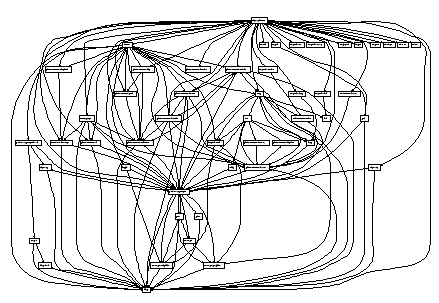 |
| ant-*, axis, bcel, classpathx-mail,
eclipse-ecj, eclipse-rcp, gcc-java, gjdoc, gnu-crypto,
jakarta-commons-*, java-1.4.2-gcj-compat, jessie, jsch,
ldapjdk, libgcj, log4j, mx4j, tomcat5-*, wsdl4j,
xml-commons-resolver, ... |
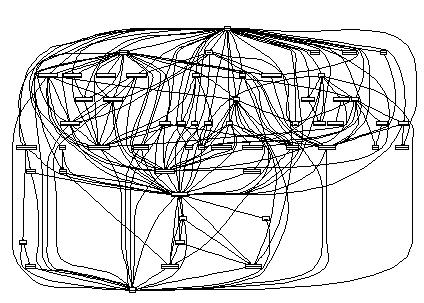 |
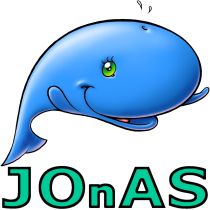 |
| avalon-framework, avalon-logkit, axis,
bcel, carol, castor, classpathx-mail, eclipse-ecj, gjdoc,
gnu-crypto, hsqldb, jakarta-commons-*,
java-1.4.2-gcj-compat, jdom, jessie, jgroups, jonathan-core,
jonathan-jeremie, joram, ldapjdk, libgcj, log4j, mx4j,
objectweb-anttask, p6spy, struts, tomcat5-*, velocity,
werken.xpath, wsdl4j, xdoclet, xjavadoc,
xml-commons-resolver, ... |
Both these program have been build upon existing Free Software
packages which are all supported now through GNU Classpath. These
programs use the easy combining of Free Software modules written in
the java programming language to the extreme and both depend (in
complex ways) on more than 50 sub-packages (only the most
significant have been shown in the table above). This puts a lot of
work on the shoulders of the packagers and reviewers. That is one of
the reasons why JOnAS isn't in all the latest distributions yet. It
takes too much time for the various package reviewers to digest the
influx of new tools into their distribution.
One could say that we have succeeded in providing working code
for a far range of existing Free Software projects written in the
java programming language. The real challenge now is no longer
producing working code (although help is still very much
appreciated!). The applications that really matter do work on the
free stack and are now included in the latest GNU/Linux
distributions. The real problem now is the packaging and versioning
of all that code. We are used to having pretty decent versioning and
dependency control on GNU/Linux systems. That is not so in the
traditional java world. The next challenge is sanely integrating the
free java world with the GNU/Linux world. And finding a solution for
the dependency and version problem that came with the liberation of
all this cool new code. We are extremely happy that the major
problem today is finding ways to sanely integrate and build the
large and diverse set of Free Software that the community
produced. And we hope your next Free Software project will be based
on GNU Classpath and this rich set of libraries and tools build on
top of it so that it will be included in your favorite GNU/Linux
distribution in the future.






